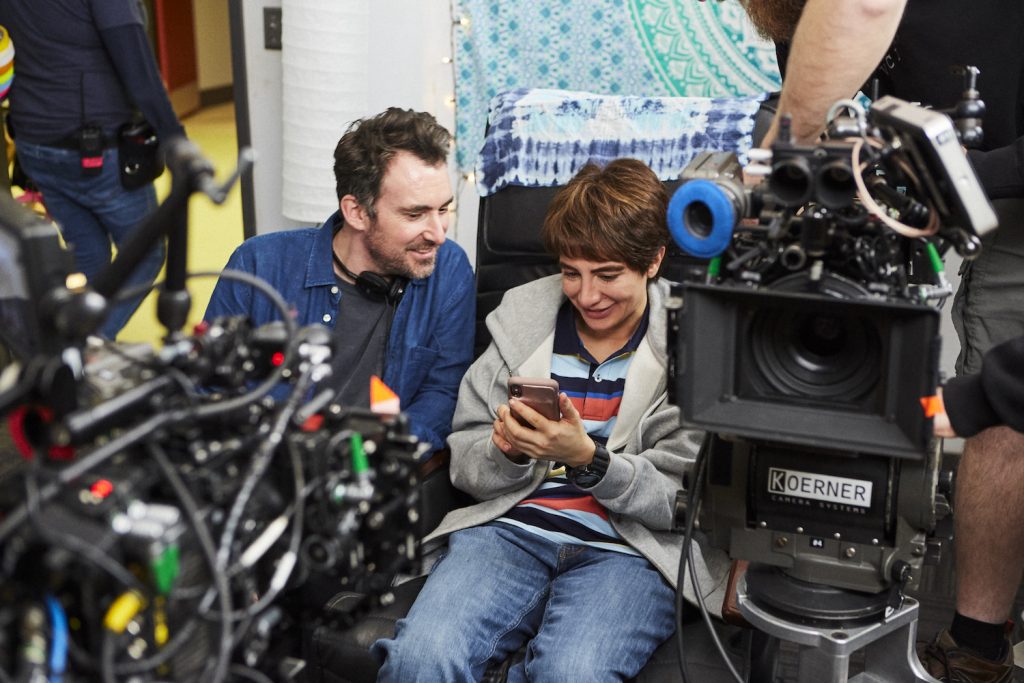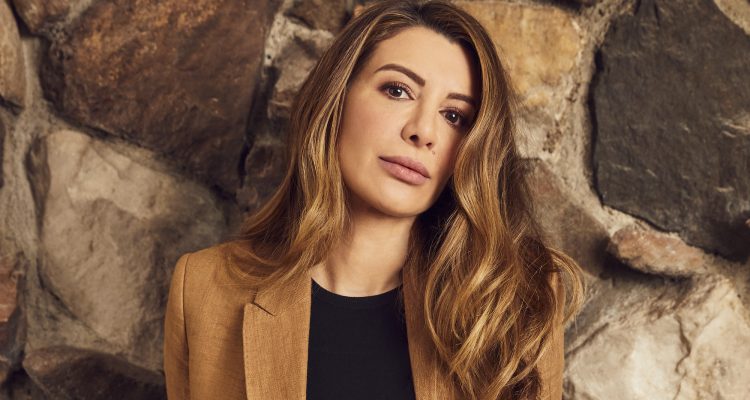Actress Nasim Pedrad is no stranger to playing outlandish characters, having cut her teeth on Saturday Night Live from 2009 to 2014 as a regular cast member. However, it’s her latest turn as an awkward 14-year-old boy in Chad that has critics and audiences raving.
Pedrad has her fingerprints on every aspect of her hit comedy series, working behind the camera as the series’ creator, showrunner, writer, and executive producer. By the time filming rolls around, Pedrad has spent more time with the material than arguably any other lead actor or actress working today.
Her total immersion in the creative process allows Pedrad to fully embody the physicality and emotions of an awkward young man dealing with growing pains. This is one of the central themes of the freshman TBS series.
Chad follows the journey of an immature freshman of Iranian descent, who is on the cusp of growing up as he strives for the elusive acceptance of his peers. As Chad gets himself into uncomfortable situations, and the dial for cringeworthy humor is turned to full volume, Chad pushes his relationships to the limits as he uses every tactic to befriend the cool kids at school.
On balancing the fine line between earnestness and distressingly embarrassing moments, Pedrad wanted to ensure that audiences understood where Chad is coming from by drawing on her own teenage years.
“My hope was that it’s coming from such a desperate place that you can empathize with him and laugh at how ridiculous he is, rather than just completely hate the character,” the Aladdin star explains. “I think everyone who went to high school can relate to the notion of just wanting to belong.”
Pedrad spoke with Awards Focus about juggling the many roles she has on set, how she came to understand Chad and his obliviousness to social norms, exploring conversations about fetishizing blackness, and whether audiences can expect to see Chad attending the Emmy Awards ceremony in September.
Awards Focus: The show was originally at FOX under the title Chad: An American Boy in 2016, but was delayed due to visa issues. Can you walk us through the process of moving from FOX to TBS?
Nasim Pedrad: Ultimately, 20th (Century Fox) passed on it but let us shop it around. I think it ended up finding its perfect home at TBS because it lives well in the cable space. I was able to navigate the sensibility and tone with a little more freedom and flexibility throughout the series. I’m grateful that it didn’t die in 2016 and that I had a chance to find it a home where it can ultimately live.
AF: How did the show evolve from its origins?
Pedrad: I would say the character (Chad) remained pretty consistent but it was more building out the world around him and some of the storylines that I was able to steer toward a cable sensibility. In that way it was quite fun. You can live in the messiness of the character a little longer, and you don’t necessarily have to have a tidy little bow at the end of the episodes where the character learns a lesson.
Sometimes Chad legitimately eats shit and doesn’t totally know why or learn from it.
AF: You’re the creator, writer, executive producer, showrunner and star of Chad. Can you talk a bit about wearing so many hats and how you were able to bring your vision for the show to life?
Pedrad: I knew that it would be a big undertaking to create my own show, even in just the sense of seeing it through from its initial conception all the way to editing the final cut of the final episode. It was really important to me to begin that process with a character that I knew I could have a lot of fun playing.
When I was developing the character of Chad, it was really just making me laugh. Normally, as an actor, you just kind of pop into a show that’s already underway. You do your part and you’re done. But I got to invent this world from scratch, everything from a kernel of an idea to the characters, the tone, and the comedic sensibility. Then, of course, hire all these incredibly talented people around me to help bring that vision to life. Once I locked in the character and his point of view, it sort of grew from there.
AF: Was there any accidental overlap when you were outfitted as Chad, the director called cut and you would speak with the crew?
Pedrad: (Laughs) Well, I was pretty practiced at turning it on and off at that point as I had shot a fully different version of the pilot for an entirely different network. I definitely had some moments of putting on my showrunner hat while fully head to toe in a very specific Chad outfit. I can safely say that people on set got a kick out of that.
I would be working on a script for the following week, or on a network call, or tending to something behind the scenes, and my hair and makeup team would quietly transform me back to Nasim. I would finish my work, look up and I was no longer Chad.

AF: How did you conceptualize Chad’s look, his mannerisms and the way he held himself?
Pedrad: That was a really fun process that was born out of figuring out his physical aesthetic and what kinds of clothes he would wear. Also how he carries his body, his wig style, and eyebrow situation. Once we were crafting those components that made the exterior shell of the character, I would then just play and improvise.
A lot of the performance and mannerisms of the character came from playing around with it, improvising dialogue, having friends ask me questions, and just earnestly responding as Chad.
It was also a great exercise in discovering the character’s pathology. I think if you can really feel dialed into who the person is and what their point of view is, it makes the writing process a lot easier.
AF: There’s an interesting family dynamic with Naz, Chad’s mother, struggling to discipline and control Chad, while his younger sister Niki is incredibly mature. Why do you think Chad is having such a hard time growing up at this particular time in his life?
Pedrad: That’s a great question. I think that he is specifically experiencing this precarious time in one’s life where the stakes of everything feel potentially life-ending, even if they’re not. At least that’s what adolescence felt like to me. I think teens are already struggling to identify their identity, and feel accepted by their peers. But as an immigrant kid, you’re also caught between these two cultures and it feels like this extra obstacle to overcome in your quest to fit in.
We meet the character during his freshman year of high school where he’s just hell bent on this mission to become popular. He’s also caught between childhood and adolescence, and he’s not as mature or experienced as his peers. So he feels this uncompromising pressure to be their equal, but as you see it in the pilot, he’s also just a kid who wants to play video games with his best friend, Peter. He’s very different from his sister who is quite advanced for her age and has a certain social ease and grace that he doesn’t.
AF: What considerations went into writing Chad’s arc in each episode and striking the balance between cringe-worthy humor and earnestness?
Pedrad: Chad is by no means a perfect character. He’s in many ways an anti-hero. He can be quite selfish and shameless and impulsive at times. There’s no one he’s not willing to throw under a bus to gain popularity. But, my hope was that it’s coming from such a desperate place that hopefully you can empathize with him and laugh at how ridiculous he is, rather than just completely hate the character. I think everyone who went to high school can relate to the notion of just wanting to belong.

AF: The third episode opened the door to conversations about blackness, and Chad’s perceived idea of coolness stemming from blackness. What were the conversations in the writer’s room around this episode and ensuring Chad didn’t come across as offensive in his awkward delivery?
Pedrad: I was really interested, especially in that episode, with what would it look like for someone like Chad to fetishize black culture, which is what he does with his limited understanding of what it means to be black in America. But, with what he’s exposed to, he’s like, ‘Oh my gosh, this is the coolest culture ever,’ and is leaning so far in that direction that he fetishizes it to the point of being called out.
I think the monologue Kris Lofton delivers where he’s calling Chad out is important. Otherwise we’re just showing his poor choice of behavior and not addressing that it’s wrong.
That was another thing, which was really interesting to explore, because Chad is just sort of unremarkable. The cool kids almost don’t notice him, which for Chad feels terrible. I was really interested in exploring a character who gets in their own way in a coming of age story, and he’s often responsible for everything bad that happens to him. He just can’t help himself.
AF: Chad’s adorable uncle Hamid mentions at one point that he too grew up as a troubled boy. Do you think that Chad is on a similar journey to Hamid in understanding himself and how to treat others?
Pedrad: My backstory for Hamid was that he grew up in Iran. So he had a wildly different upbringing than Chad by virtue of the fact that he grew up in another country, which is so different from where he’s spending his adult years.
Hamid is a character that’s based on my own father, who’s crushingly sweet to a degree that breaks my heart. I think of what he had to endure growing up in Iran, during the Iran and Iraq war, and then surviving a revolution and all of these serious, heavy things that someone like Chad, who’s going to an American high school, might not be able to relate to.


